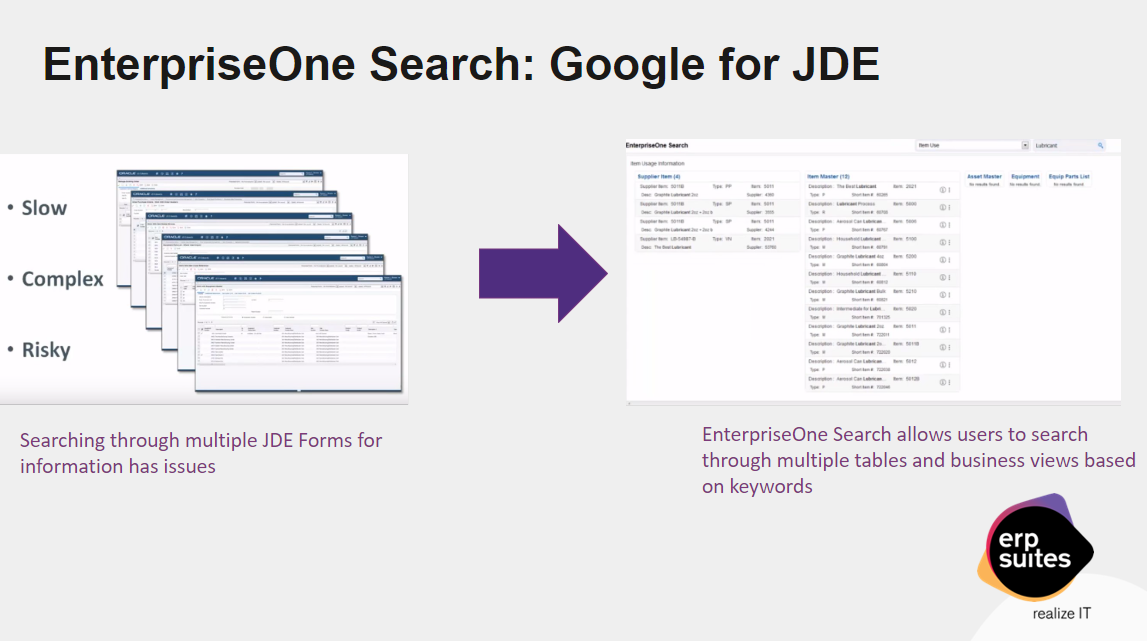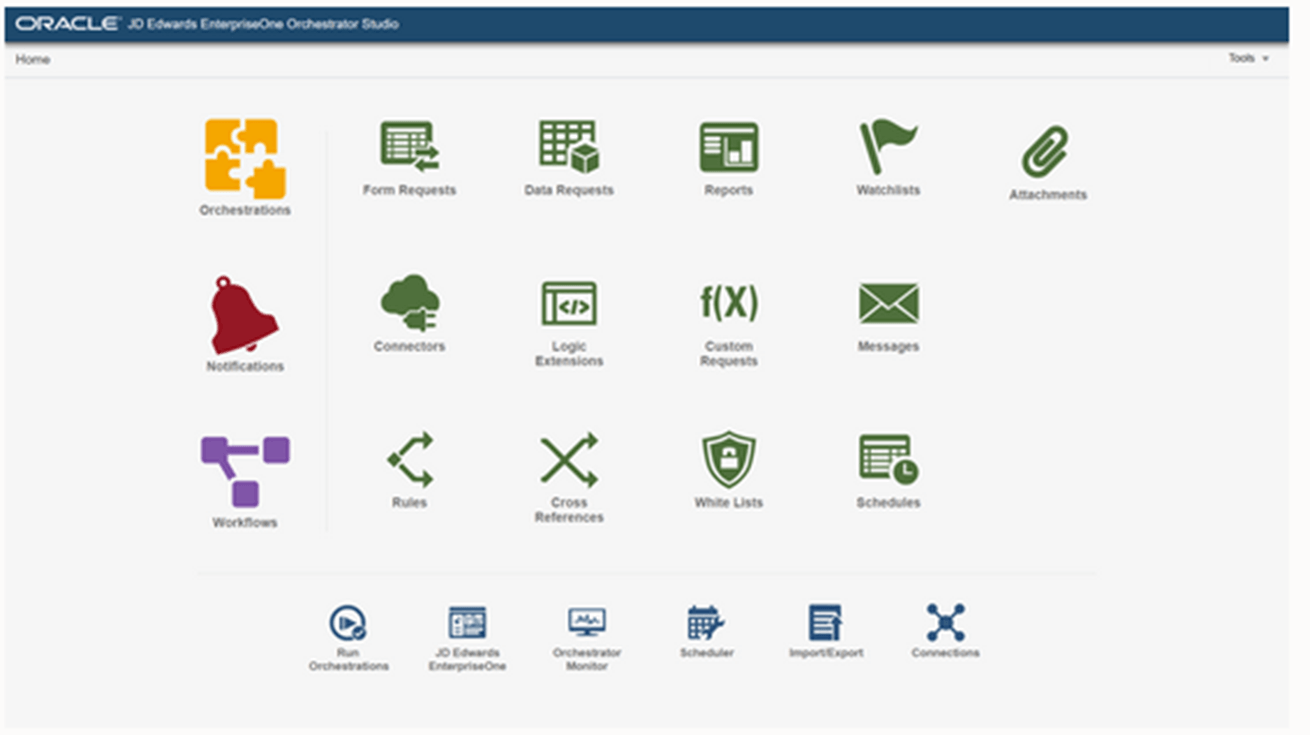The Death of RF Guns? The JD Edwards Scanning Revolution You Didn't See Coming!
July 30th, 2025
2 min read
Abstract
Mobile data collection and barcode scanning have significantly evolved alongside JD Edwards over the past two decades. In this episode of "Not Your Grandpa’s JD Edwards," Steve Clampett from ERP Suites explores how scanning technology has transformed from early RF systems to modern AI-driven solutions. This discussion highlights the current options, key considerations for decision-makers, and strategies to future-proof investments.
Table of Contents
-
Introduction
-
Early Days of Barcode Scanning in JD Edwards
-
Challenges and Limitations of Legacy Systems
-
Evolution of Customer Expectations
-
Custom, Packaged, or Hybrid Solutions?
-
Integration Improvements with JD Edwards
-
Future Trends: Cloud and AI
-
Future-Proofing Your Data Collection
-
Practical Advice for Modernizing Your Scanning Systems
-
Conclusion and Call to Action
1. Introduction
Mobile data collection has undergone substantial changes since the early 2000s. Joined by Steve Clampett from ERP Suites, we dive into how barcode scanning solutions have evolved within JD Edwards, exploring the technological advancements and shifts in customer expectations.
2. Early Days of Barcode Scanning in JD Edwards
Initially, barcode scanning addressed manual, paper-based processes primarily in inventory management, procurement, and shipping. Early solutions significantly improved accuracy and data collection efficiency, despite limitations in hardware, software, and scalability.
3. Challenges and Limitations of Legacy Systems
Legacy scanning systems faced limitations including:
-
Hardware and software inflexibility
-
Difficulty scaling operations
-
Integration complexities with legacy systems like AS/400 and DB2
These challenges underscored the importance of careful initial planning and investment.
4. Evolution of Customer Expectations
As JD Edwards evolved, so did customer expectations. Users began demanding:
-
Enhanced integration capabilities
-
More tailored solutions addressing specific business processes
-
Increased automation and functionality
This evolution paralleled significant improvements in JD Edwards' technology, from basic inventory tracking to robust, integrated systems.
5. Custom, Packaged, or Hybrid Solutions?
Companies now have diverse options, including:
-
Custom-built solutions tailored to exact business needs
-
Packaged solutions offering standard workflows
-
Hybrid solutions combining the best of both worlds
Steve emphasizes that understanding internal capabilities and goals is essential when choosing between these options.
6. Integration Improvements with JD Edwards
Modern tools like JD Edwards Orchestrator have vastly reduced integration friction. Today's tools support seamless, flexible data integration, significantly simplifying barcode scanning implementations compared to legacy systems.
7. Future Trends: Cloud and AI
While cloud solutions offer attractive scalability and convenience, current flexibility gaps still make them less ideal for some JD Edwards customers. AI's potential impact on scanning solutions is still emerging, though it promises to simplify error detection, optimize processes, and enhance data accuracy further.
8. Future-Proofing Your Data Collection
To ensure long-term success:
-
Regularly perform health checks on your scanning systems
-
Maintain code currency in your JD Edwards environment
-
Consistently review transaction accuracy and process optimization
Future-proofing involves proactive maintenance and continuous system optimization.
9. Practical Advice for Modernizing Your Scanning Systems
Before undertaking a modernization project:
-
Conduct thorough research on available technologies
-
Assess your team's technical capabilities
-
Understand the specific integration and architectural requirements
Preparation is key to avoiding costly mistakes and ensuring successful outcomes.
10. Conclusion and Call to Action
Mobile scanning technologies continue to advance, presenting numerous opportunities for JD Edwards users. ERP Suites offers expert guidance to help businesses navigate these changes and future-proof their investments.
Ready to modernize your mobile data collection? Reach out to ERP Suites to begin the journey confidently.
If you found this helpful, subscribe, leave a rating, and share this episode with your JD Edwards community.
Video Strategist at ERP Suites


.png?width=960&height=540&name=Blog%20Images%20(90).png)
.png?width=960&height=540&name=Blog%20Images%20(86).png)
.png?width=960&height=540&name=Blog%20Images%20(80).png)
.png?width=960&height=540&name=Blog%20Images%20(71).png)
.png?width=960&height=540&name=Blog%20Images%20(61).png)
.png?width=960&height=540&name=Blog%20Images%20(53).png)
.png?width=960&height=540&name=Blog%20Images%20(48).png)
.png?width=960&height=540&name=Blog%20Images%20(44).png)
.png?width=960&height=540&name=Blog%20Images%20(43).png)
.png?width=960&height=540&name=Blog%20Images%20(42).png)
.png?width=960&height=540&name=Blog%20Images%20(39).png)

.png?width=960&height=540&name=Blog%20Images%20(30).png)
.png?width=960&height=540&name=Blog%20Images%20(29).png)

.png?width=960&height=540&name=Blog%20Images%20(20).png)
.png?width=960&height=540&name=Blog%20Images%20(17).png)
.png?width=960&height=540&name=Blog%20Images%20(18).png)